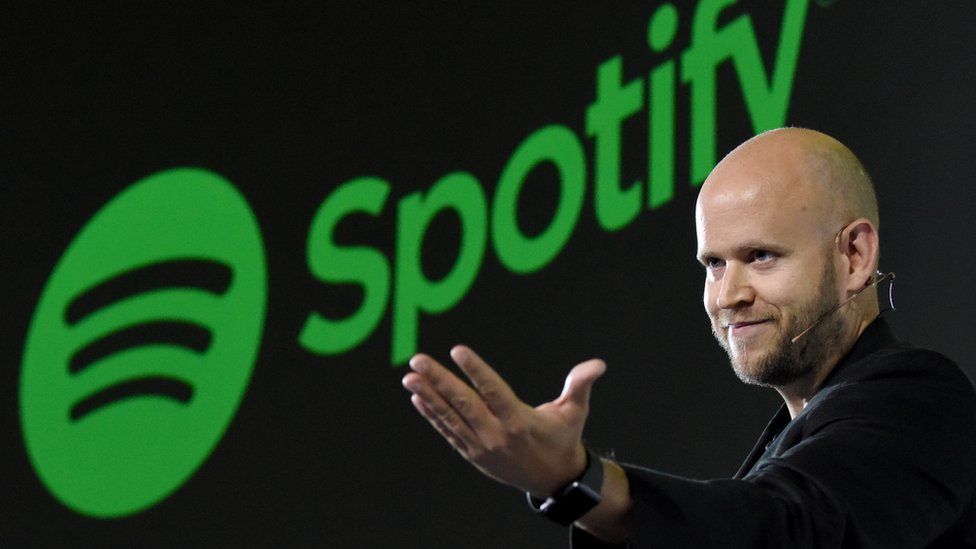Is Spotify really worth $23bn?
- Published
- comments

Spotify has filed to list on the New York Stock Exchange in a move that may value the world's biggest music streaming service at more than $23bn (£16.7bn).
In an unconventional move, the firm will list shares directly on the NYSE.
Rather than issue new shares, Spotify's existing shareholders will take their shares directly to the market.
That will allow early investors and employees to sell their stakes and is not intended to raise new funding.
Mark Mulligan, a UK-based music industry analyst at MIDiA Research, said: "It's about a company that is letting its investors get their returns so it can move on to the next stage of its career."
Spotify has offered a streaming service since 2008 and has 159 million monthly active users including 71 million paid subscribers globally.
Apple Music has about 36 million subscribers, but unlike Spotify it does not offer a free tier supported by advertising.
Analysis: North America technology reporter Dave Lee
The fact that Spotify exists at all is something of a minor miracle: unknown Swedish company convinces major record labels to upload millions upon millions of songs for people to listen to without buying them. It must have been quite the pitch.
Sure, the labels get royalties but it's pennies - fractions of pennies - on what they used to get from "traditional" online sales.
Regardless, it's been clear for a long time that streaming is the music industry's future.
On Wednesday, Spotify announced it would go public - but that's not to say it is here to stay. The company has long been surrounded by threats, and it's no different today.
Apple, Amazon and Google are also in the streaming game and - unlike Spotify - all sell devices on which consumers can listen to music.
And while Spotify has signed deals with all the "big three" record labels - Warner, Universal and Sony - it's the music executives that still hold the bargaining chips.
Calculating value
Spotify said its shares sold for between $37.50 and $125 each in private transactions last year and more than $132 this year. The company's potential valuation is based on a combination of stock price and how many shares it has outstanding.
The prices shared by Spotify suggest a range of $6.3bn to more than $23bn.
The higher figure would make Spotify one of the biggest public debuts of a tech company since 2012, said Kathleen Smith, principal at Renaissance Capital, which provides institutional research and manages exchange traded funds focused on new public companies.
She cautioned, however, that private investors have tended to value firms more highly than public markets in recent years.
Snap, owner of Snapchat, for example also had an almost $30bn market capitalisation after its first day of trading last year, but it has struggled to sustain that figure.
"This could be an issue - could it possibly sustain those valuations?" she said.
In its filing with the Securities and Exchange Commission, Spotify said it has made annual losses every year and lost more than €1.2bn in losses in 2017.
However, revenues rose almost 40% to €4bn last year, according to the filing.
Europe is its largest region, with 58 million monthly active users, followed by North America. It is also making inroads in Latin America and other parts of the world.
Churn rates, which measure cancellation, have fallen, while the time spent using the service has increased.
"All of that stuff paint a really strong story to investors that they're on the right path," Mr Mulligan said.
Future plans
In its filing, Spotify says it aims to "unlock the potential of human creativity by giving a million creative artists the opportunity to live off their art and billions of fans the opportunity to enjoy and be inspired by these creators."
The firm said it had paid more than €8bn in royalties to artists, music labels, and publishers since its launch.
The filing also hinted at plans to expand beyond music into other forms of radio.
"With our ad-supported service, we believe there is a large opportunity to grow users and gain market share from traditional terrestrial radio," it said.
- Published1 March 2018
- Published27 February 2018
- Published2 January 2018
- Published8 December 2017